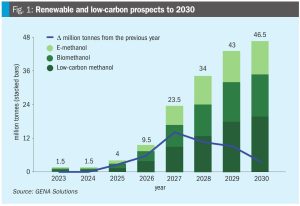
Consortium formed to look at low carbon methanol project
Oman’s Ministry of Transport, Communications and Information Technology has signed a memorandum of understanding with a consortium comprising HIF EMEA GmbH, Acciona Nordex Green Hydrogen and Al Meera Investments to jointly explore the development of a low carbon methanol supply and bunkering hub at Dhofar in Oman. This strategic collaboration aligns with Oman’s Vision 2040 strategy, supporting national decarbonisation targets and positioning Oman as a pre-eminent green maritime and bunkering hub in the Middle East.





